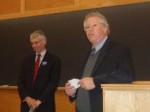Photojournalists provide alternate view of Middle East

If America really wants to help Iraq, the troops should leave and take their idea of a picture-perfect democracy with them, an Iraqi-Palestinian blogger told students on Nov. 2.”The best way to support democracy and human rights and social change in Iraq and Iran is to just leave them. Leave them, I don’t need someone to come 10,000 miles away to come and liberate us,” Raed Jarrar shouted out with his hands waving and his eyes wide.
Jarrar, a native of Iraq, was one of three speakers to visit Castleton to present a Just Foreign Policy program aimed at educating students about what is actually happening in Iran and Iraq. They said the media is telling us only the cleaner, American side of what is happening in those countries.
The speakers were accompanied by graphic, award-winning photos from Iraq, Iran and Lebanon showing everything from war to revolution.
When viewing the photographs after the event, some students became emotional, especially when they got to one taken in Lebanon by Andrew Stern entitled “Ambulances Bombed by Israeli Warplanes.”
“That’s really messed up,” said Matt Kimball, who helped organize the event through the Reel Action Club.
. “Oh my God! That’s just wrong,” echoed fellow student Colleen Senecal.
It was the group’s third stop of their tour across New England, leaving 13 more stops ahead of them.
“People in the U.S. in general are getting used to this norm of interceding in other people’s business,” Jarrar said.
He told students that he believes that the United States and other countries are just making things worse and creating a more complicated situation. It’s a disaster that’s been going on for the last century, he said.
Author of ‘The Bush Agenda,’ Antonia Juhasz, backed up Jarrar’s beliefs by citing statistics done by the Bush administration’s own State Department. She said the statistics found that 65 percent of the people living in Bagdad said they would feel safer if U.S. military left.
“And 70 percent would feel safer and they would prefer for the U.S. military to leave – within a year,” she said, quoting the State Department statistics.
She also stated that, of U.S. soldiers on the ground in Iraq, 75 percent said they too think that they should be gone in a year. This was made in public in February.
The war is being fought for oil – exactly the opposite of what President Bush made us believe, she said to nodding student heads.
“I have quotes in my book from several U.S. soldiers on the ground in Iraq and mothers of soldiers who have died who say, the once they got on the ground, they were immediately assigned to protect oil wells and oil infrastructure,” she said. “Who said, ‘There is no way I should be here to protect oil and oil infrastructure.'”
Rostam Pourzal, a native of Iran and president of the U.S. branch of the campaign against sanctions and military intervention in Iran, spoke to students about the United States’ push for oil in his country and the current effort to thwart its nuclear program.
Pourzal said there is a big argument now between U.S. and European allies versus Iran about nuclear reactors and nuclear fuel tanks, which Iran bought from American companies.
They argue that Iran has lots of natural gas and oil reserves to create energy, so they don’t see any reason for them to need nuclear energy, he said.
But he stressed that in recent years Iran’s population tripled and Iran has developed its industry and electricity network tremendously. So they need more energy, Pourzal said.
But the Washington Post says, “you have all the oil and gas to burn; you must have some other motives, which means that you are dangerous,” he said.
He said he finds it strange for U.S. to argue about nuclear power with Iran, since it is the only country in the world that has upwards of 2,000 nuclear warheads — even now after the cold war.
“And it’s the only country that has dropped the nuclear bomb on civilian targets in the world,” he said. “It is strange for them to say nuclear power is bad for Iran, especially in the face of the fact that the U.S. tolerates nuclear outlaws to like India, Pakistan, and Israel and in fact work with them.
“So basically U.S. is saying, if you are in my plan, you can do a lot of nasty things, and you are not a threat. But if you are independent country and want to follow your own path, you are dangerous.”
Pourzal said he isn’t arguing that Iran does not have nuclear weapon program or may militarize its nuclear program. The truth is, he doesn’t know. But he said being surrounded by nuclear powers and with U.S. ships and submarines off the coast, leaders of Iran should feel “nervous.”
Communication Professor Sanjukta Ghosh, who helped organize the event, said she was disappointed that not many students came to listen to the speakers. She wanted to see the Huden Dining Hall atrium packed saying students need to hear the message that these people brought.
“We are them, we should know about their country and learn, because we are them and they are us,” Ghosh said.
Senior Kurt Hunt, who is in the Army reserves and could end up in Iraq after graduation, said he learned from the event.
“You don’t see Bush telling us why we should be there, but these people are here to tell us why we shouldn’t be there in details,” he said.” It is great to hear real life experts in a one-on-one information session.






